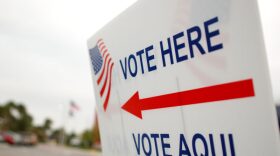Texans across the state will soon be inundated with TV and radio ads ahead of this year’s presidential election. However, the ads won't be from candidates running for office, but from the state of Texas. The state-funded ads are intended to inform voters of the recent court-ordered changes to Texas' voter ID law.
When Texas lost a legal battle over its voter ID law earlier this year, they were given a couple of instructions. They had to change the law and make it easier for people to vote this November. They also had to let Texas voters know what changed, and they have to spend $2.5 million doing that.
Alicia Pierce, a spokesperson with the Texas Secretary of State’s office, says TV and radio ads have just been shipped to markets for all 254 counties in the state – and they should be airing “any day now.”
“It does take time from once it leaves the studio to actually get up on air, but they were approved and could be running as soon as today,” she says.
The state’s voter outreach materials, which include these ads, had to be cleared by the plaintiffs in the voter ID case. Lawyers representing the plaintiffs complained to a federal judge recently that the state was not making it clear to people who had trouble getting an ID that they could cast a regular ballot this year.
Pierce says that is being conveyed in the ads, along with the acceptable forms of ID voters can bring to the polls.
“It does focus on what you need to bring to the polls and, specifically, that if you have been voting with an approved photo ID, you can keep doing that,” she says. “And now that ID can be expired up to four years, and then if you don’t have an approved photo ID – and you have a reasonable impediment to getting such an ID – that you will have options when you go to the polls.”
The state's voter ID law, which was one of the strictest in the country, was ruled by a federal appeals court earlier this summer to violate the Voting Rights Act. Judges said the law made it harder for minorities to vote.
The state and plaintiffs in the case agreed on a remedy for the November presidential election. However, the state has appealed the federal appeals court decision to the U.S. Supreme Court for after the election.







